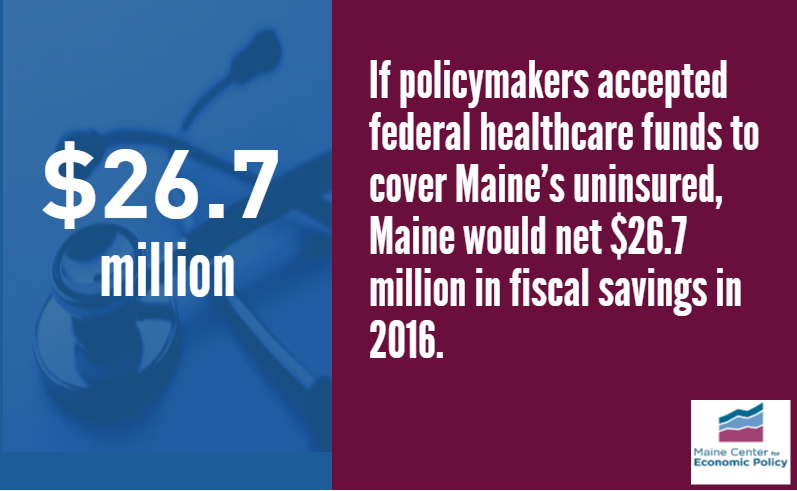Despite five bipartisan votes in favor of accepting federal healthcare funds to cover 70,000 uninsured Mainers, five successive vetoes by the governor have ensured that Maine has left nearly $1 billion on the table since 2014. A report by an outside consulting firm has added a new wrinkle to Maine’s healthcare standoff: if policymakers accepted the federal funds, Maine would realize a net gain of $26.7 million in general fund savings and new revenue in calendar year 2016 – even after all administrative costs are considered.
That $26.7 million is not a projection unspooled from a software application; Manatt Consulting has worked closely with other states expanding Medicaid, and has based its analysis on real savings experienced in other states, factoring in Maine enrollment and spending data based on available Maine DHHS information. Manatt projects that savings will occur in three main areas:
- Maine would save $12.6 million by covering already-covered populations at the higher match rate available under health reform. Maine currently covers the medically needy, pregnant women, people with disabilities, people with HIV, and some cancer patients at current Medicaid match rates. Some of these groups would be eligible for coverage at the higher match rate. – Currently, the federal government will cover 100 percent of costs connected with Medicaid expansion.
- Maine would save $27.9 million by using healthcare funds to cover services to the uninsured currently paid for from state general fund dollars. General fund monies currently cover costs associated with treating uninsured people in substance abuse and mental health programs, prisoners’ inpatient medical costs, and family planning services for the uninsured. If Maine accepted federal healthcare funds, by far the largest savings would be connected with mental health and substance abuse: $20.3 million.
- Maine would realize $3.4 million in revenue gains connected to healthcare expansion. Maine hospitals’ net operating revenue is currently taxed at a rate of 2.23%. Hospitals in the state have been struggling with high rates of uncompensated care and bad debt linked in part to the remaining uninsured who would have been covered had Maine expanded Medicaid. In 2013, Maine hospitals’ overall margins were in the red. Manatt estimates that the newly insured population would boost hospital revenues by $150 million – increasing state tax revenues by $3.4 million, without increasing the percentage of the hospital tax.
The Manatt report stands in sharp contrast to the discredited report issued in 2013 by the Alexander Group, which projected ruinous costs associated with accepting federal healthcare funds – based on a number of faulty assumptions, including projecting that poverty in Maine will increase by a third. If this dire projection were accurate, 18 percent of Maine residents will live under the poverty line by 2025 – a level not seen since LBJ was president. Despite the subsequent disgrace of proven plagiarism and termination of the nearly $1 million no-bid contract that supported it, the Alexander report has lurched forward in zombie form, healthcare opponents still disingenuously invoking its ominous, discredited “data.”– until now. There’s a new report in town – and twenty-nine states and the District of Columbia that have accepted federal healthcare funds, insuring millions of Americans. With every passing week, the rationales for preventing $1 billion in federal healthcare funds from reaching Maine people and providers grow flimsier.



